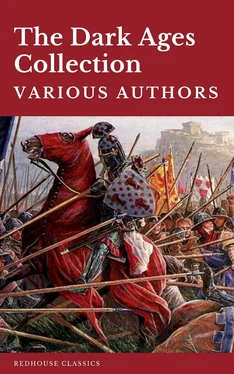There were few events of capital importance during the reign of Justin. Its chief significance lay in the new orientation of religious policy which was inaugurated at the very beginning, and in the long apprenticeship to statecraft which it imposed on Justinian before the full power and responsibility of government devolved on him. Next to him the most influential minister was Proclus the Quaestor, an incorruptible man who had the reputation of an Aristides. 32There was some danger of a breach with the Ostrogothic ruler of Italy in A.D. 525-526, but this menace was averted by his death, 33and the Empire enjoyed peace till the last year of the reign, when war broke out with Persia.
In the spring of A.D. 527 Justin was stricken down by a dangerous illness, and he yielded to the solicitations of the Senate to co-opt Justinian as his colleague. The act of coronation was performed in the great Triklinos in the Palace (on April 4), and it seems that the Patriarch, in the absence of the Emperor, placed the diadem on the head of the new Augustus. The subsequent ceremonies were carried out in the Delphax, where the Imperial guards were assembled, and not, as was usual, in the Hippodrome. 34Justin recovered, but only to survive for a few months. He died on August 1, from an ulcer in the foot where, in one of his old campaigns, he had been wounded by an arrow. 35
§ 2. Justinian
The Emperor Justinian was about forty-five years old when he ascended the throne. 36Of his personal appearance we can form some idea from the description of contemporary writers 37and from portraits on his coins and in mosaic pictures. 38He was of middle height, neither thin nor fat; his smooth shaven face was round, he had a straight nose, a firm chin, curly hair which, as he aged, became thin in front. A slight smile seems to have been characteristic. The bust which appears on the coinage issued when he had reached the age of fifty-six, shows that there was some truth in the resemblance which a hostile writer detected between his countenance and that of the Emperor Domitian.
His intellectual talents were far above the ordinary standard of Roman Emperors, and if fortune had not called him to the throne, he would have attained eminence in some other career. For with his natural gifts he possessed an energy which nothing seemed to tire; he loved work, and it is not improbable that he was the most hardworking man in the Empire. Though his mind was of that order which enjoys occupying itself with details, it was capable of conceiving large ideas and embracing many interests. He permitted himself no self-indulgence; and his temperance was ascetic. In Lent he used to fast entirely for two days, and during the rest of the season he abstained from wine and lived on wild herbs dressed with oil and vinegar. He slept little and worked far into the night. 39His manners were naturally affable. As Emperor he was easily accessible, and showed no offence if a bold or tactless subject spoke with a freedom which others would have resented as disrespectful. He was master of his temper, and seldom broke out into anger. 40He could exhibit, too, the quality of mercy. Probus, the nephew of Anastasius, accused of reviling him, was tried for treason. When the report of the trial was laid before the Emperor he tore it up and said to Probus, “I pardon you for your offence against me. Pray that God also may pardon you.” 41
The reign of a ruler endowed with these estimable qualities, animated by a strong and unflagging sense of duty, devoting himself day and night to the interests of the State 42for thirty-eight years, could not fail to be memorable. Memorable assuredly it was. Justinian wrought not only for his own time but for posterity. He enhanced the prestige of the Empire and enlarged its borders. He bequeathed, by his monumental work in Roman law, an enduring heritage to Europe; while the building of the Church of St. Sophia would in itself be an imperishable title to the gratitude of men. These achievements, however, are only one side of the picture. The successes and glories of his reign were to be purchased at a heavy cost, and the strain which he imposed on the resources of the State was followed by decline and disaster after his death. Perhaps no more scathing denunciation of the character, aims, and methods of a ruler has ever been written than the notorious indictment which the contemporary historian Procopius committed to the pages of a Secret History, wherein Justinian is represented as a malignant demon in human form. 43Though the exaggerations of the writer are so gross and manifest that his venomous pen defeats its own object, there is sufficient evidence from other sources to show that the reign of Justinian was, in many ways, far from being a blessing to his subjects.
The capital error of Justinian’s policy was due to a theory which, though not explicitly formulated till quite recent times, has misled many eminent and well-meaning sovrans and statesmen in all periods of history. It is the theory that the expansion of a state and the exaltation of its prestige and honour are ends in themselves, and valuable without any regard to the happiness of the men and women of whom the state consists. If this proposition had been presented nakedly either to Justinian or to Louis XIV, he would have indignantly repudiated it, but both these monarchs, like many another, acted on it, with most unhappy consequences for their subjects. Justinian possessed imagination. He had formed a high ideal of the might and majesty of the Empire of which he was the master. It humiliated him to contrast its moderate limits with the vast extent of territory over which the word of Constantine or Theodosius the Great had been law. He was dazzled by the idea of restoring the old boundaries of the Roman Empire. For though he only succeeded in recovering, as we shall see, Africa, Italy, and a small strip of Spain, his designs reached to Gaul, if not to Britain. After he had conquered the African provinces he announced his ambitious policy. “We have good hopes that God will grant us to restore our authority over the remaining countries which the ancient Romans possessed to the limits of both oceans and lost by subsequent neglect.” 44In drawing up this magnificent programme, Justinian did not consider whether such an extension of his government would make his subjects, who had to bear the costs of his campaigns, happier or better. He assumed that whatever increased the power and glory of the state must also increase the well-being of its members. The resources of the state were not more than sufficient to protect the eastern frontier against the Persians and the Danubian against the barbarians of the north; and if the Emperor had been content to perform these duties more efficiently than his predecessors, he would unquestionably have deserved better of his subjects.
His conception of the greatness of the Empire was indissolubly associated with his conception of the greatness of its sovran, and he asserted the absolutism of the autocrat in a degree which no Emperor had hitherto attempted. 45This was conspicuously shown in the dictatorship which he claimed over the Church. He was the first Emperor who studied dogmatic questions independently and systematically, and he had all the confidence of a professional theologian. A theologian on the throne is a public danger, and the principle of persecuting opinion, which had been fitfully and mildly pursued in the fifth century, was applied rigorously and systematically under Justinian. His determination to be supreme in all departments made him impatient of advice; he did not like his commands to be discussed, and he left to his ministers little latitude for decision. His passion for dealing personally with the minute details of government had the same unfortunate results as in the case of Philip II. 46Like other autocrats, he was jealous and suspicious, and ready to listen to calumnies against his most loyal servants. And there was a vein of weakness in his character. He faltered at one supremely critical moment of his reign, and his consort, Theodora, had an influence over him which no woman could have exercised over an Augustus or a Constantine.
Читать дальше












